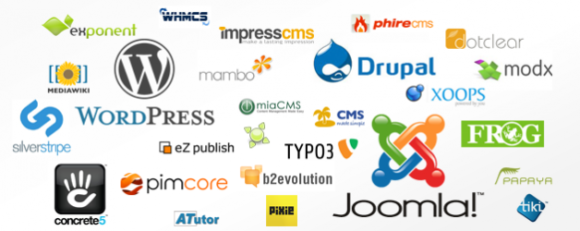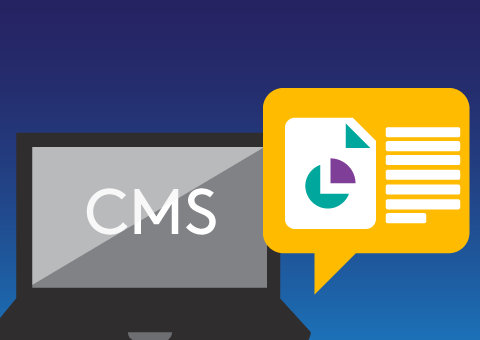Which CMS Is Best for Your Website?
What exactly is a Content Management System (or CMS)? And, with over 100 Content Management Systems to choose from, how do you decide which is best for your organization?

Luckily, we can help. A CMS is a technology platform that is used to build a website and add functionality (modules), which makes administering and editing the website easy. It’s also beneficial because it allows anyone – even people without technical skills – to perform basic updates. Some content management systems that you may have heard of include WordPress, Drupal, or Sitefinity. For the most part, every website that Media Genesis builds includes a CMS so clients can easily make updates to the sites themselves. Part of our process is to consult with the client to help them figure out which CMS will work the best for their particular needs.
In this article, I’ll share our top ten considerations for selecting a CMS. This information will be helpful for any company who wants to perform a self-assessment or be more educated when working with an agency like Media Genesis.
Top Ten Considerations for Selecting a Content Management System (CMS)
What CMS is Your Company Currently Using?
Most websites are built on a CMS, so if your company is already using a CMS, you should consider this when choosing the CMS that’s best for you. There are two main reasons you may want to maintain using the same CMS: it meets your current functional needs and your staff is familiar with how to use it. Just make sure it is a good platform for the direction you want to take your site before you make your final decision.
A Platform Your IT Team is Comfortable With
After a new website has been built on a CMS, it needs to be hosted and maintained. This includes keeping CMS functionality and security patches updated, keeping modules updated, and keeping up with responsiveness for new devices/browsers. Whoever will be doing this maintenance needs to be comfortable with the technology – some users may prefer Windows .NET vs open source solutions, for example. This could be your in-house IT team or, more typically, the agency that helped you build your site.
Third-party Integration
A CMS is able to handle a lot of functionality and many regular updates that need to be made to the content on the website, but there are often third-party systems that need to be integrated to add functionality. Third-party software may be needed for Point of Sale (POS), recruiting, investor relations, client portals, etc. There are many ways for integration to happen, but if any third-party systems require a certain Operating System (like Windows), this may be a factor in the CMS you select.

Plug-ins Available
While a CMS out-of-the-box will include a lot of core functionality, you can add on functionality using plug-ins (modules). For WordPress alone, there are approximately 55,000 plug-ins available as of this writing. Too many installed plug-ins can bog down your system and make maintenance more challenging, but they are a great way to add needed functionality and many standard functions like Calendar, SEO, and E-Commerce.
CMS Support Community / Licensing
There are licensed (paid) and free, open source CMS options available. If you are using a licensed proprietary CMS like Sitefinity, then you will typically pay for annual upgrades and support, which means you will have a dedicated company you can reach out to for support. If you use an open source CMS like Drupal, then you will rely on your developer and development community for needed assistance. In the end, selecting a company with a good track record or large development community makes a lot of sense.
Hosting
You should also decide early on where your site will be hosted and maintained. Some companies prefer on-site hosting, while many others are opting for off-site. This, again, will depend on which CMS you select, what other systems may need to be integrated, and who will be providing the support. A wide array of hosting options exist, including dedicated, VPS, shared, and cloud-based. You will also need to consider various hosting environments like development, staging, and production.
Web Developer (Technical) Support
When a site is built in a CMS, it needs to be established which functionality/content the company will be able to update on their own. You may think you want to be able to update everything, but usually there are aspects of a site (i.e. main navigation, site layout/structure, header/footer) that remain fixed to maintain a professional appearance. This also ensures that you can’t “break” your website’s layout when doing basic updates. As more complex functionality and new layouts become necessary, a web developer will be needed to assist.
Custom Programming Needs
An important aspect to consider when selecting the best CMS for your company is your internal process(es). It’s nice to be able to use a CMS or plug-ins exactly as they were built, but it doesn’t always work out that way. In some cases, it could even be detrimental to your business to try to force them to work. I recommend doing as much as possible with items in their original state, but know that some custom programming may be needed with whichever system you choose. Therefore, be sure to pick a system that allows for your custom needs.
Security
Security is a critical aspect of everything we do online. Even if you don’t know much about content management systems, you will still have likely heard of WordPress – it started as a blogging platform and is now the most widely used CMS on the web. (Plus it’s free and open source.) But because it is so popular, it has become a prime target for hacking. This just means you must be diligent with maintaining security updates for the core platform and plug-ins. And remember, different CMS platforms will have different support needs.
Scalability
When you select a CMS, you want to make sure it will meet your current and future needs. Most sites start at a certain level of complexity and then grow to add on more advanced functionality. For example, maybe your future site requirements are: e-commerce, multi-lingual, ability to manage multiple websites under one CMS, and integration with CRM/ERP/POS or some other system. You need to consider your long-term needs; your CMS should be able to support your organization for years to come.
So, which is the best CMS?
To tell you the truth, it depends. Hopefully, I’ve given you a number of very important factors to consider when selecting the best one for you. And, if you need help or a second set of eyes on your selection, you can always connect with us at Media Genesis. Call us at (248) 687-7888 or send us an email at inquiry@mediaG.com to learn more.


.png)
